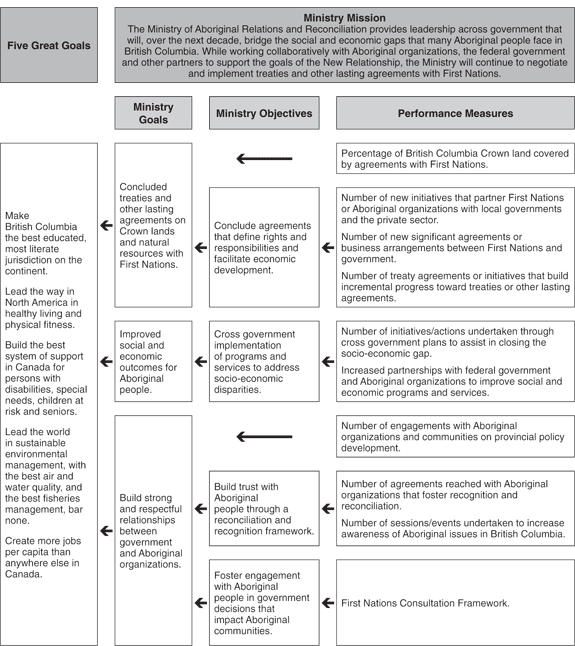Goals, Objectives, Strategies and Results
Overview
This section identifies the Ministry's goals and outlines how specific objectives and strategies will contribute to the achievement
of these goals. Brief descriptions are provided on some of the initiatives and activities the Ministry will undertake to achieve
its goals and objectives. Performance measures and targets have been established that link to the Ministry's goals and objectives,
and prior year results are provided for comparison. Progress in achieving the targets identified is monitored and reported
out in the Ministry's Annual Service Plan Report.
Ministry Goals
To realize the mission of the Ministry of Aboriginal Relations and Reconciliation, resources will be focused to work collaboratively
with Aboriginal organizations, communities and other government agencies. This will allow the Ministry to meet its three goals:
- Concluded treaties and other lasting agreements on Crown lands and natural resources with First Nations.
- Improved social and economic outcomes for Aboriginal people.
- Build strong and respectful relationships between government and Aboriginal organizations.
Linkage to the Five Great Goals
Goals and practical outcomes specific to Aboriginal people are identified in other ministries' and agencies' service plans.
The Ministry is committed to closing the socio-economic gap and works collaboratively with these ministries to ensure tangible
outcomes for Aboriginal people. The following indicators of success in each of the Great Goal areas include, but are not limited
to:
Goal 1: Make British Columbia the best educated, most literate jurisdiction on the continent.
- Improved K–12 completion rates for Aboriginal people.
- Increased Aboriginal post-secondary participation.
- Preservation, revitalization, retention and teaching of Aboriginal languages.
Goal 2: Lead the way in North America in healthy living and physical fitness.
- Reduced incidence of preventable diseases, substance abuse, family violence and youth suicide among Aboriginal people.
- Increased number of trained Aboriginal health professionals.
Goal 3: Build the best system of support in Canada for persons with disabilities, special needs, children at risk and seniors.
- Improved access to satisfactory housing for Aboriginal people.
- Reduced number of Aboriginal children in care.
Goal 4: Lead the world in sustainable environmental management, with the best air and water quality, and the best fisheries
management, bar none.
- Negotiated agreements and treaties that provide opportunities for First Nations to engage in both economic and environmental
benefits.
- First Nations engaged in land use planning.
Goal 5: Create more jobs per capita than anywhere else in Canada.
- Coordinated and partnered socio-economic initiatives for Aboriginal people living in urban areas such as Greater Vancouver
and Prince George.
- Reduced barriers to recruitment and retention of Aboriginal people.
- Negotiated agreements that incorporate First Nations into regional and provincial economies.
- Improved Aboriginal cultural and tourism opportunities.
Cross Ministry Initiatives
As a centre of excellence on Aboriginal policy, the Ministry provides strategic advice, identifies opportunities and facilitates
the removal of barriers to stimulate positive change for First Nations and Aboriginal people. A solid history of relationship-building
allows the Ministry to influence other ministries in order to implement a unified and integrated cross government approach
to decision-making and new initiatives, from concept to operation. This reflects the active partnership being built between
Aboriginal leaders and the Province.
The Ministry works collaboratively to support cross ministry initiatives and to ensure these initiatives reflect the interests
and needs of Aboriginal people and contribute to the essence of the New Relationship:
Literacy
The Ministry works with the Ministry of Education on increasing Aboriginal graduation rates and literacy programs (including
Aboriginal languages), through coordination of the First Citizens Fund which supports the preservation and teaching of Aboriginal
languages.
StrongStart BC
The Ministry works with the Ministry of Children and Family Development on developing a strategy to better coordinate funding
and support to strengthen the capacity of Aboriginal families and communities to care for their children.
Mountain Pine Beetle
The Ministry works with the Ministry of Forests and Range to increase First Nations' participation in forestry and planning
to mitigate the mountain pine beetle's impact and diversify regional economies.
The 2010 Olympic and Paralympic Winter Games
The Ministry works with the Ministry of Economic Development to support the implementation of legacy agreements with the Squamish
and Lil'wat First Nations.
New legislation is also anticipated in 2007 to ratify final agreements with First Nations. This legislation has been granted
an exemption and will not increase the regulatory burden as, similar to the Nisga'a Final Agreement Act, it is required to bring into force the tripartite intergovernmental agreement between the First Nation, British Columbia
and Canada.
Performance Plan Summary Table
